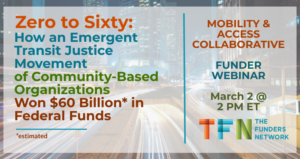BY TFN STAFF
Faced with devastating cuts to the transit service on which essential workers and many people with low incomes depend, local advocates from around the country came together to build a national infrastructure that secured billions in federal COVID-19 relief funding. Along the way, they changed the nature of the transit conversation in Congress to one that centers riders instead of the traditionally dominant voices of big agencies, big labor, big green and big construction interests. A set of transit justice principles, created by the network, guide the work.
Are you interested from learning from funders and organizers about their experiences, what they are doing and learning, and what comes next?
Join the Mobility and Access Collaborative, a TFN initiative, at 2 p.m. ET March 2 for Zero to Sixty: How an Emergent Transit Justice Movement of Community-Based Organizations Won an Estimated $60 Billion in Federal Funds.
The lessons learned about power building, organizing and networking are relevant to anyone interested in systems change and rebooting conversations.
Be sure to register for this funder webinar by March 1 in order to receive log-in details.
Speakers:
Welcome:
Darryl Young, Director, Sustainable Cities Program, Summit Foundation
What We Accomplished:
David Bragdon, Executive Director, TransitCenter
Theory of Change:
LeeAnn Hall, Executive Director, Alliance for a Just Society
How We Built Power: Local leaders tell their stories:
Betsy Plum, Executive Director, NY Riders Alliance
Joshua Malloy, Community Organizer, Pittsburghers for Public Transit
Azhar Chougle, Executive Director, Miami-Dade Transit Alliance
Jessica Meaney, Executive Director, Investing in Place
Scott Frazier, Consultant, Investing in Place
This webinar will also include a Q&A with funders

